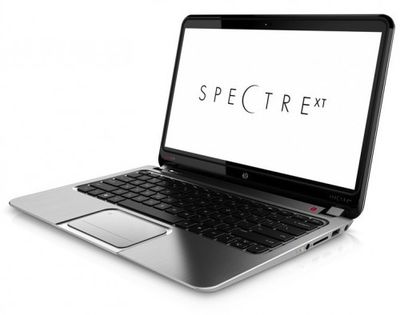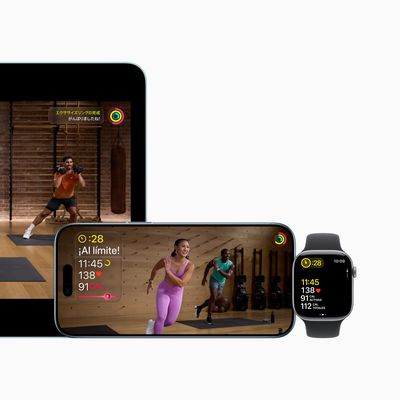HP Defends New Ultrabook Design Against Noted Similarities to Apple's MacBook Air
With the introduction of its new ENVY Spectre XT Ultrabook today, HP is finding itself defending the lightweight notebook's design as observers have raised comparisons to Apple's MacBook Air. The issue was addressed directly in a Q&A session with HP design executive Stacy Wolff, with Engadget reporting on Wolff's response to a question speculating that Apple might try to sue over the design. Wolff argued:
I would go back to the TC1000 [Tablet PC] from about 10 years, and that's a tablet. I think if you look at the new Spectre XT, there are similarities in a way, not due to Apple but due to the way technologies developed. Apple may like to think that they own silver, but they don't. In no way did HP try to mimic Apple. In life there are a lot of similarities.

Engadget followed up with Wolff after the session, and he offered some more thoughts on how there are only so many solutions to a given design problem and how HP's design differs from Apple's.
The thing is that you have to design what's right, and that is that sometimes the wedge is the right solution, silver is the right solution. I see a lot of differences as much as the similarities. I think anybody that's close enough to the business sees that there are differences in the design. Ours is rubber-coated at the bottom. We use magnesium; they didn't do that -- they use CNC aluminum. We did a brush pattern on our product; they didn't. We did a different kind of keyboard execution. We did audio as a component; they didn't. So there are a lot of things I can list off that are differences; but if you want to look at a macro level, there are a lot of similarities to everything in the market that's an Ultrabook today. It is not because those guys did it first; it's just that's where the form factor is leading it.
Wolff goes on to cite the "form follows function" argument in claiming that there are only so many ways internal components can fit into a notebook and that the wedge shape is a natural result of how those physical constraints manifest themselves in a usable product design.
Responding to comments about the black "chiclet" keyboard on silver body being similar to Apple's implementation, Wolff notes that a simple color choice doesn't amount to copying and that HP's work with chiclet-style keyboards dates back to the mid-1980s.
HP is far from the first ultrabook manufacturer to be the subject of questions about potentially copying Apple's MacBook Air. Most notably, ASUS was one of the first company's to show off an ultrabook design in the middle of last year, with that design bearing an even more remarkable similarity to the MacBook Air. PC manufacturers have been rushing to bring ultrabooks to the market, now taking advantage of Intel's new Ivy Bridge processors in an effort to take on the MacBook Air in what is predicted to be the future of notebook computing.
Popular Stories
Apple has ordered 22 million OLED panels from Samsung Display for the first foldable iPhone, signaling a significantly larger production target than the display industry had previously anticipated, ET News reports.
In the now-seemingly deleted report, ET News claimed that Samsung plans to mass-produce 11 million inward-folding OLED displays for Apple next year, as well as 11 million...
Apple is about to release iOS 26.2, the second major point update for iPhones since iOS 26 was rolled out in September, and there are at least 15 notable changes and improvements worth checking out. We've rounded them up below.
Apple is expected to roll out iOS 26.2 to compatible devices sometime between December 8 and December 16. When the update drops, you can check Apple's servers for the ...
Apple is actively testing under-screen Face ID for next year's iPhone 18 Pro models using a special "spliced micro-transparent glass" window built into the display, claims a Chinese leaker.
According to "Smart Pikachu," a Weibo account that has previously shared accurate supply-chain details on Chinese Android hardware, Apple is testing the special glass as a way to let the TrueDepth...
Apple today seeded the second release candidate version of iOS 26.2 to developers and public beta testers, with the software coming one week after Apple seeded the first RC. The release candidate represents the final version iOS 26.2 that will be provided to the public if no further bugs are found.
Registered developers and public beta testers can download the betas from the Settings app on...
Google Maps on iOS quietly gained a new feature recently that automatically recognizes where you've parked your vehicle and saves the location for you.
Announced on LinkedIn by Rio Akasaka, Google Maps' senior product manager, the new feature auto-detects your parked location even if you don't use the parking pin function, saves it for up to 48 hours, and then automatically removes it once...
Apple's chipmaking chief Johny Srouji has reportedly indicated that he plans to continue working for the company for the foreseeable future.
"I love my team, and I love my job at Apple, and I don't plan on leaving anytime soon," said Srouji, in a memo obtained by Bloomberg's Mark Gurman.
Here is Srouji's full memo, as shared by Bloomberg:I know you've been reading all kind of rumors and...
Apple's iPhone development roadmap runs several years into the future and the company is continually working with suppliers on several successive iPhone models at the same time, which is why we often get rumored features months ahead of launch. The iPhone 18 series is no different, and we already have a good idea of what to expect for the iPhone 18 Pro and iPhone 18 Pro Max.
One thing worth...
Apple and Google are teaming up to make it easier for users to switch between iPhone and Android smartphones, according to 9to5Google. There is a new Android Canary build available today that simplifies data transfer between two smartphones, and Apple is going to implement the functionality in an upcoming iOS 26 beta.
Apple already has a Move to iOS app for transferring data from an Android...
Apple today announced that Fitness+ is expanding to 28 new markets on December 15 in the service's largest international rollout since launch, accompanied by new language dubbing and a K-Pop music genre.
Apple Fitness+ will become available in Chile, Hong Kong, India, the Netherlands, Singapore, Taiwan, and additional regions on December 15, with Japan scheduled to follow early next year....
Apple's senior vice president of hardware technologies Johny Srouji could be the next leading executive to leave the company amid an alarming exodus of leading employees, Bloomberg's Mark Gurman reports.
Srouji apparently recently told CEO Tim Cook that he is "seriously considering leaving" in the near future. He intends to join another company if he departs. Srouji leads Apple's chip design ...


























